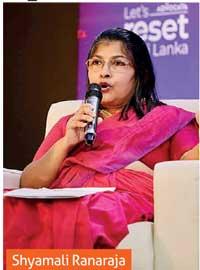09 Aug 2022 - {{hitsCtrl.values.hits}}
By Shabiya Ali Ahlam
Sri Lanka’s archaic labour laws make the challenge of pulling more workers into the formal workforce even harder, which has resulted in many opting to remain in the informal sector, a labour law expert opined.
 According to Shyamali Ranaraja, an expert in Sri Lanka’s labour laws, it is realistically difficult to employ anyone in the country since the process is made so very complex and difficult.
According to Shyamali Ranaraja, an expert in Sri Lanka’s labour laws, it is realistically difficult to employ anyone in the country since the process is made so very complex and difficult.
“There are more incentives for employers and employees really like to stay in the informal sector than to become formalised,” she said. While this is not the only reason for many to prefer the informal sector, it is a “very big” reason for the current scenario, added Ranarajah, while presenting her views at the Reform Now conference hosted recently by the Colombo-based economic think tank Advocata Institute.
At present, about 60 percent of the country’s working population is in the informal sector, statistics from the International Labour Organisation (ILO) show.
“Sri Lanka (labour law) is completely outdated and overcrowded and the delays are something which are nightmares for the ordinary litigant.
Employers, unfortunately, in the private sector bear the total responsibility for many of the costs of labour, unlike in other countries, where the unemployment benefits and social security benefits are borne by a central fund or by the state with contributions from employers and employees,” said Ranaraja.
Sri Lanka has about 40 laws that relate to employment and only about 15 of these are actually in use on a day-to-day basis.
The county has two labour law regimes, one for the public sector and the other for the private sector. The laws for the latter have not been compiled into a labour code but instead are a mere collection of laws with no kind of logical sequencing. “If you are an employer or an employee trying to understand this, it is difficult. Most are dated before the independence. We have multiple laws that apply in different sectors and it’s a sectoral law in some ways as well as stratified law.
So, this is very complex for someone to understand. Labour law should be accessible to everyone, especially to employees,” asserted the legal expert.
She pointed out that the legal amendments are somewhat slow and they have not been done in a cohesive way or in a pragmatic way. They are also not aligned with development goals or with the needs of the country.
“The labour law system really creates a lot of work for lawyers but really doesn’t do much for employment growth or for employers and employees to understand and apply and also comply with the labour laws,” added Ranarajah.
07 Nov 2024 2 hours ago
07 Nov 2024 2 hours ago
07 Nov 2024 3 hours ago
07 Nov 2024 4 hours ago
07 Nov 2024 4 hours ago